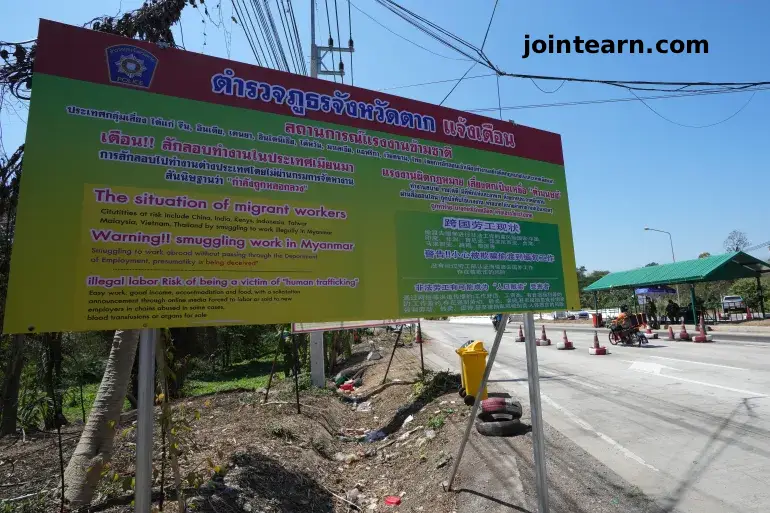
BANGKOK / YANGON — October 21, 2025 — Myanmar’s military says it has arrested more than 2,000 people during a massive raid on KK Park, one of Southeast Asia’s most notorious scam compounds, located near the country’s border with Thailand, according to state media reports.
The operation, described by analysts as one of the largest anti-scam crackdowns in Myanmar’s history, targeted a sprawling criminal hub long linked to international human trafficking, cyber scams, and money laundering.
The Myanmar Alin daily reported on Monday that soldiers stormed more than 250 low-rise buildings within the complex — including warehouses, shophouses, and other structures — and seized 30 Starlink internet satellites that were allegedly used to keep the network of scam operations online even during power outages.
Massive Arrests and Technology Seizure
According to state media, authorities detained 2,198 individuals, including 1,645 men, 445 women, and 98 male security guards. Their nationalities were not immediately disclosed, though similar raids in the region have often involved victims and perpetrators from China, Thailand, Vietnam, and Malaysia.
Photos released by the Myanmar Military True News Information Team showed troops standing beside confiscated Starlink terminals, which officials claimed were essential tools for maintaining global communication and online transactions at the compound.
Location and Background
KK Park is located in Myawaddy Township in Kayin (Karen) State, directly across the Moei River from the Thai border town of Mae Sot. The area has been a flashpoint in Myanmar’s ongoing civil conflict since the 2021 military coup, with frequent clashes between the junta, the People’s Defence Force (PDF), and ethnic Karen insurgent groups.
Military spokesperson Major-General Zaw Min Tun claimed that members of the Karen National Union (KNU) — one of the country’s oldest ethnic armed groups fighting the junta — were complicit in the scam operations at KK Park. The KNU has not commented on the allegation.
Human Trafficking and Scam Syndicates
The raid comes amid mounting pressure from Thailand and China for Myanmar to shut down the transnational scam networks operating within its borders.
Rights groups say the KK Park compound and similar sites are part of a regional criminal infrastructure that has enslaved tens of thousands of people, many trafficked under false pretenses of legitimate work.
Once inside, victims are often forced to carry out romance, cryptocurrency, and investment scams targeting victims around the world under the threat of violence or torture.
In January, the issue gained national attention in China when actor Wang Xing was trafficked to a scam centre near the Thai-Myanmar border before being rescued by Thai authorities.
Global and Regional Fallout
Thai police estimate that more than 100,000 people are currently trapped in scam compounds along the Thai-Myanmar border. The problem has become a major diplomatic concern across Southeast Asia, with similar operations spreading into Cambodia, Laos, and the Philippines.
In September, the U.S. Department of the Treasury sanctioned more than 20 companies and individuals in Myanmar and Cambodia for their roles in regional scam operations, describing them as part of a “multi-billion-dollar criminal economy built on coercion and exploitation.”
A Continuing Crisis
Despite the mass arrests, experts warn that dismantling the criminal infrastructure surrounding KK Park will not be easy. Myanmar’s ongoing civil war, porous borders, and weak rule of law have created ideal conditions for syndicates to thrive.
Human rights advocates have called for international oversight to ensure that trafficking victims among those arrested are identified and protected, rather than punished alongside their captors.
As Myanmar’s internal conflict deepens, the KK Park raid highlights both the scale of the country’s lawlessness and the regional stakes in confronting Southeast Asia’s growing cyber-slavery economy.


Leave a Reply